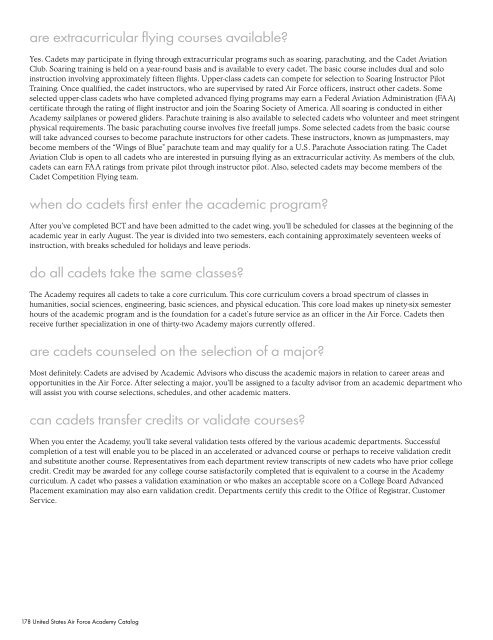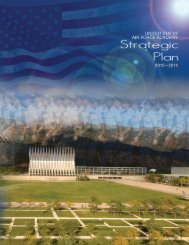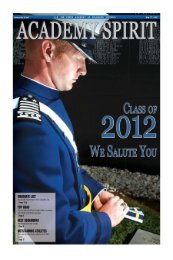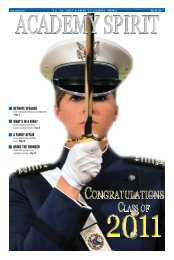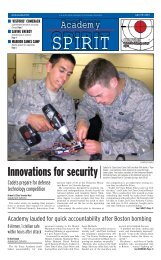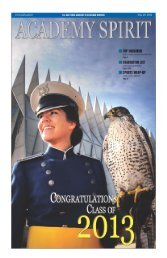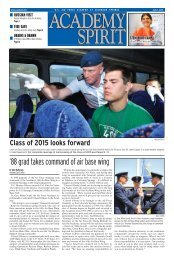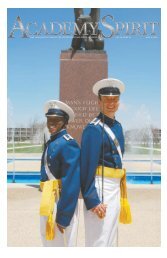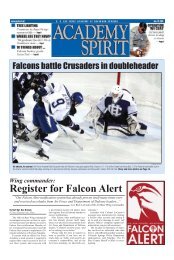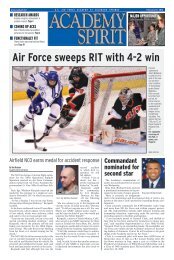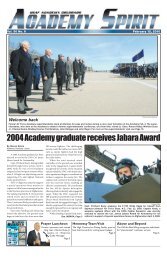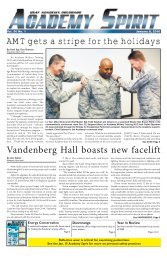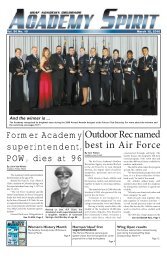2008-2009 Catalog - United States Air Force Academy
2008-2009 Catalog - United States Air Force Academy
2008-2009 Catalog - United States Air Force Academy
You also want an ePaper? Increase the reach of your titles
YUMPU automatically turns print PDFs into web optimized ePapers that Google loves.
are extracurricular flying courses available?<br />
Yes. Cadets may participate in flying through extracurricular programs such as soaring, parachuting, and the Cadet Aviation<br />
Club. Soaring training is held on a year-round basis and is available to every cadet. The basic course includes dual and solo<br />
instruction involving approximately fifteen flights. Upper-class cadets can compete for selection to Soaring Instructor Pilot<br />
Training. Once qualified, the cadet instructors, who are supervised by rated <strong>Air</strong> <strong>Force</strong> officers, instruct other cadets. Some<br />
selected upper-class cadets who have completed advanced flying programs may earn a Federal Aviation Administration (FAA)<br />
certificate through the rating of flight instructor and join the Soaring Society of America. All soaring is conducted in either<br />
<strong>Academy</strong> sailplanes or powered gliders. Parachute training is also available to selected cadets who volunteer and meet stringent<br />
physical requirements. The basic parachuting course involves five freefall jumps. Some selected cadets from the basic course<br />
will take advanced courses to become parachute instructors for other cadets. These instructors, known as jumpmasters, may<br />
become members of the “Wings of Blue” parachute team and may qualify for a U.S. Parachute Association rating. The Cadet<br />
Aviation Club is open to all cadets who are interested in pursuing flying as an extracurricular activity. As members of the club,<br />
cadets can earn FAA ratings from private pilot through instructor pilot. Also, selected cadets may become members of the<br />
Cadet Competition Flying team.<br />
when do cadets first enter the academic program?<br />
After you’ve completed BCT and have been admitted to the cadet wing, you’ll be scheduled for classes at the beginning of the<br />
academic year in early August. The year is divided into two semesters, each containing approximately seventeen weeks of<br />
instruction, with breaks scheduled for holidays and leave periods.<br />
do all cadets take the same classes?<br />
The <strong>Academy</strong> requires all cadets to take a core curriculum. This core curriculum covers a broad spectrum of classes in<br />
humanities, social sciences, engineering, basic sciences, and physical education. This core load makes up ninety-six semester<br />
hours of the academic program and is the foundation for a cadet’s future service as an officer in the <strong>Air</strong> <strong>Force</strong>. Cadets then<br />
receive further specialization in one of thirty-two <strong>Academy</strong> majors currently offered.<br />
are cadets counseled on the selection of a major?<br />
Most definitely. Cadets are advised by Academic Advisors who discuss the academic majors in relation to career areas and<br />
opportunities in the <strong>Air</strong> <strong>Force</strong>. After selecting a major, you’ll be assigned to a faculty advisor from an academic department who<br />
will assist you with course selections, schedules, and other academic matters.<br />
can cadets transfer credits or validate courses?<br />
When you enter the <strong>Academy</strong>, you’ll take several validation tests offered by the various academic departments. Successful<br />
completion of a test will enable you to be placed in an accelerated or advanced course or perhaps to receive validation credit<br />
and substitute another course. Representatives from each department review transcripts of new cadets who have prior college<br />
credit. Credit may be awarded for any college course satisfactorily completed that is equivalent to a course in the <strong>Academy</strong><br />
curriculum. A cadet who passes a validation examination or who makes an acceptable score on a College Board Advanced<br />
Placement examination may also earn validation credit. Departments certify this credit to the Office of Registrar, Customer<br />
Service.<br />
178 <strong>United</strong> <strong>States</strong> <strong>Air</strong> <strong>Force</strong> <strong>Academy</strong> <strong>Catalog</strong>


